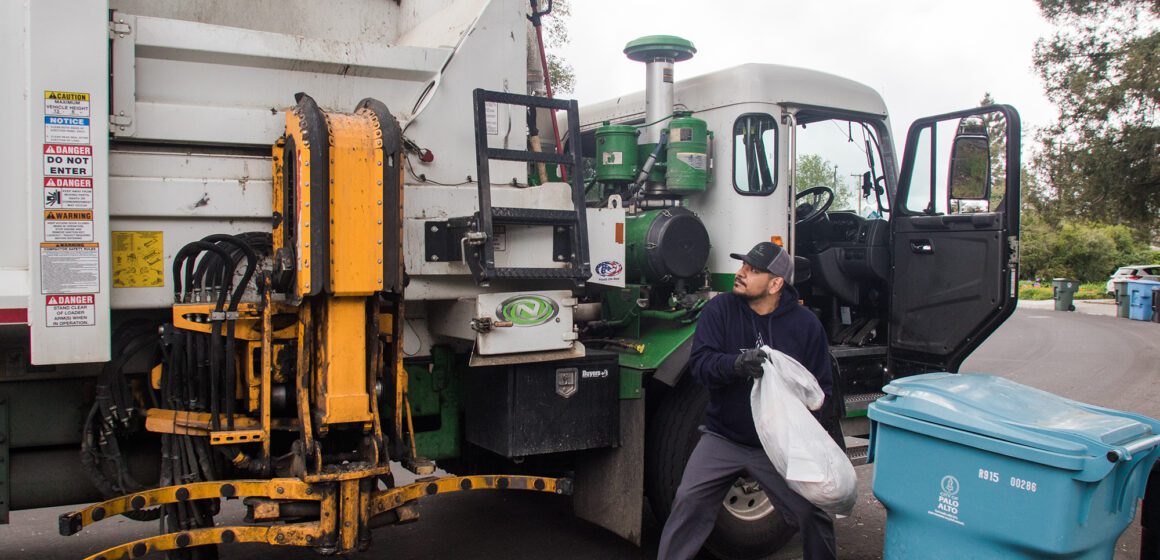Citing a track record of stable rates and flexible services, Palo Alto is preparing to renew its contract with GreenWaste Palo Alto, the trash hauler that has been collecting the city’s garbage, compost and recyclable materials since 2009.
Under a deal that the City Council is scheduled to approve next week, GreenWaste would receive an average of $24.8 million per year for the duration of the four-year term. This includes paying the hauler $1.4 million for vehicle repair and maintenance, and container replacement. It will also allow GreenWaste to continue to store equipment at a city-owned site at 1237 San Antonio Road, next to the area where the nonprofit LifeMoves plans to open its new transitional housing project next year.
Among the chief virtues of the city’s agreement with GreenWaste is stable rates. Public Works Director Brad Eggleston noted at a Nov. 4 discussion of the new GreenWaste agreement that the refuse rates for commercial and residential customers hadn’t increased since 2017 and 2018, respectively. That stands in stark contrast to most of Palo Alto’s utility rates, which tend to increase by varying amounts every year.
While prices for refuse collection vary by container size, Palo Alto customers generally pay less for trash pickup than residents in neighboring if they use small trash containers and more than their counterparts in other cities if their black bins are on the larger side.
For the smallest “supersaver” size, which has a volume of 20 to 24 gallons, the monthly rate is $27.81, well below the average of $39.40 in 10 surrounding jurisdictions. The same size bin costs $50.31 in Menlo Park and $34.90 in Mountain View. For the slightly larger 32 to 34-gallon bin, the rate is $50.07 in Palo Alto, compared to an average of $51.40.
About 88% of Palo Alto’s residential ratepayers fall into these two categories, according to Public Works staff.
By contrast, the rate for the largest container, which is 95 to 96 gallons, is $150.22 in Palo Alto, well above the $130.94 average. It’s also well above $92.21 in Menlo Park and $139.65 in Mountain View, according to a report from the Public Works Department.
Another virtue of the proposed deal is flexibility. Since the city entered into the agreement, it has revised the contract several times to add services. In 2019, a contract amendment created an enhanced “clean-up day” and deconstruction services. Another amendment in 2022 required domestic recycling of mixed paper and mixed rigid plastics.
“For the City, the GWPA contract has locked in an efficient, stable, and consistent high-quality service, innovative processing facilities, predictable pricing, and the ability to expand on services to achieve the City’s zero waste and sustainability goals,” a report from the Public Works Department states. “This has helped with long-term budgeting and protected the city from volatile market prices, and the cost volatility and risks associated with competitive bidding processes.”
While the Finance Committee unanimously supported advancing the four-year extension, councilmembers urged staff to make sure that the hauler’s use of land on San Antonio Road for storage does not get in the way of another local priority: finding space for oversized vehicles. Councilmember Julie Lythcott-Haims observed that the site at 1237 San Antonio Road, next to the Mountain View border, could accommodate some of the RVs that would be displaced from their existing locations along the city’s commercial strips.
“If there is a potential use there, I’d hate for us to go all the way down the line with new contracts and so on without having considered whether we need to carve out something,” Lythcott-Haims said.
The issue of RV enforcement will return to the council on Dec. 8, when councilmembers consider an ordinance that would ban inoperable vehicles from parking on city streets. This would be the first phase of a broader plan to increase enforcement on RVs and provide social services for vehicle dwellers.
Public Works staff noted that the GreenWaste site on San Antonio faces some challenges, including the need for environmental remediation and wetlands mitigation. Nevertheless, the site can be considered as part of the city’s efforts to address oversized vehicles, the Public Works report states.
Lythcott-Haims also questioned the contract provisions under which Palo Alto would be paying for vehicle replacement and mainteinance. Even though the parent company of GreenWaste Palo Alto operates in other jurisdictions, Public Works staff assured the Finance Committee that all the vehicles that the city pays for are dedicated to collections in Palo Alto.
“At the end of the GreenWaste Palo Alto contract, the city will have the option to either acquire the vehicles from GreenWaste to be used by future provider, or instruct GreenWaste to sell the vehicles and provide the city with the amount received for the sale,” Paula Borges, the city’s solid waste manager, said during the meeting.
This story originally appeared in Palo Alto Weekly. Gennady Sheyner is the editor of Palo Alto Weekly and Palo Alto Online. As a former staff writer, he has won awards for his coverage of elections, land use, business, technology and breaking news.



Leave a Reply
You must be logged in to post a comment.